Yuyutsu Ram Dass Sharma
Bogove sem videl ležati na tleh kot brezdomce
»Poezija je vrnila moj svet in življenje v ravnotežje in mi dala moči za naprej,« se zamisli ugledni Yuyutsu Sharma med najinim pogovorom. Ljubljano je obiskal ob izidu slovenskega prevoda svoje pesniške zbirke z naslovom Pretreseni spevi: Pesmi iz potresnega Nepala. Nastale so po uničujočem potresu v Nepalu leta 2015, ki je za seboj pustil na tisoče mrtvih, več kot milijon ljudi pa je sredi ostrega himalajskega podnebja ostalo brez strehe nad glavo. V slovenščino je od njegovih desetih pesniških zbirk prevedena tudi Jezero Fewa in konj (2008). Svetovno znani himalajski pesnik in novinar, ki se je rodil v severni Indiji, zdaj pa živi v Katmanduju, je tudi velik popotnik. Njegova poezija, o kateri pravi, da se ukvarja z resničnim življenjem ter temeljnimi resnicami, je prevedena v številne jezike. Rad se odzove tudi povabilom za branje svojih pesmi in tako večinoma neutrudno potuje.
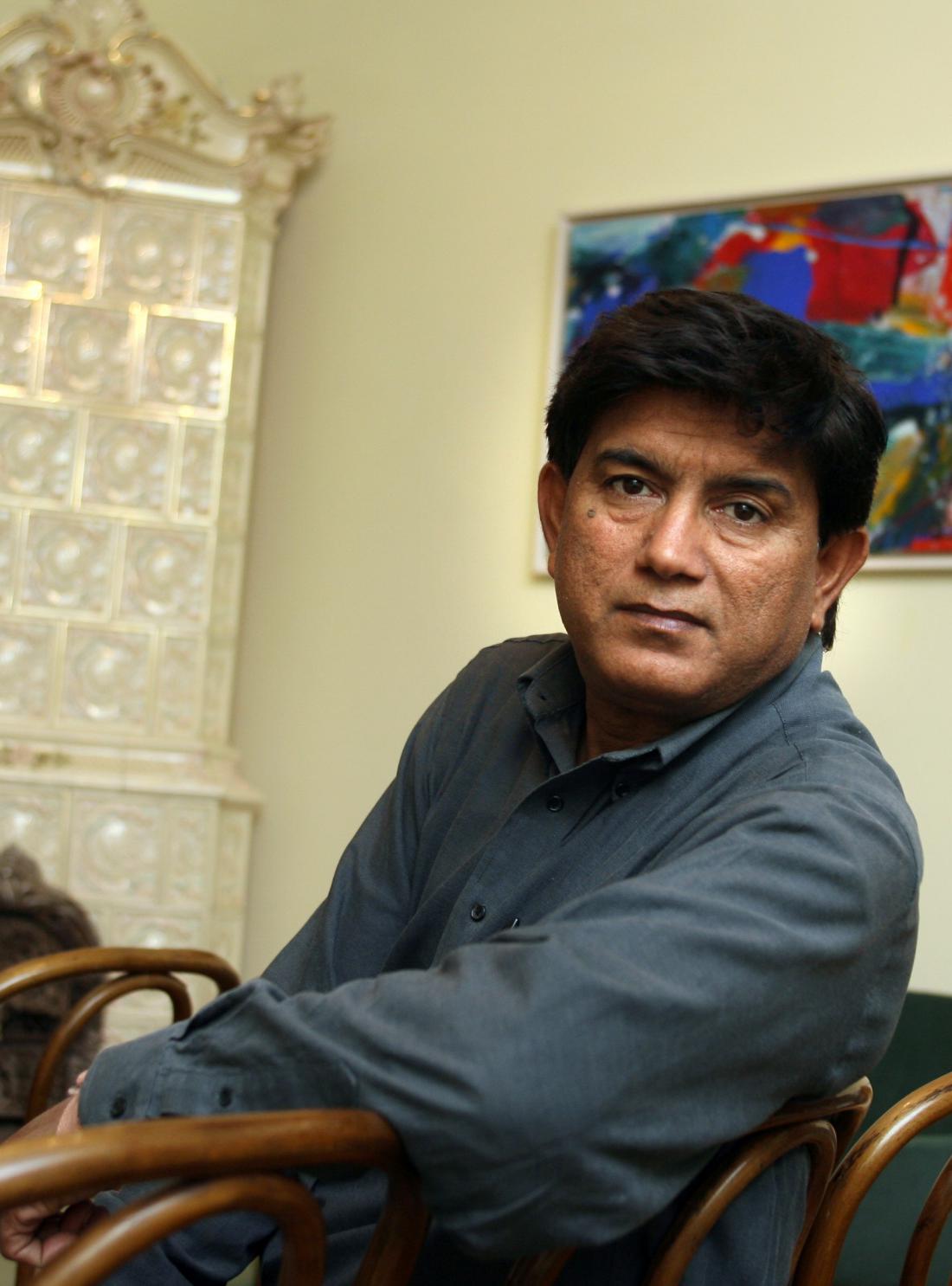
Med potresom ste bili na bralni turneji po Severni in Srednji Ameriki. Kaj je sledilo, ko ste prejeli vest o potresu?
Z ženo sva bila v New Yorku. O potresu sva slišala, potem pa je nastal komunikacijski mrk in ni bilo ne interneta ne telefonskih ali drugih povezav. Bila sva povsem iz sebe. Šele po treh dneh sva izvedela, da so najini najbližji živi. Ko sva se vrnila, smo doživeli še en potres. Bilo je katastrofalno. Velika svetišča in petnadstropne pagode, ki smo jih imeli za samoumevne, so se zrušili. Na lepem so se spremenili v nič. Ko sem videl kip gospoda Višnuja in drugih bogov iz našega svetišča ležati na tleh kot brezdomce, sem bil izjemno prizadet. Prizor sem imel za napoved gorja. Kot če bi videli kip Jezusa Kristusa iz vaše domače cerkve nenadoma na ulici. Starodavne mestne zgradbe so se spremenile v ruševine. Vse je bilo prežeto s strahom pred grožnjo in popolno zmedo.
Nepal je bil do 50. let prejšnjega stoletja prava Šangri-La (fiktivna dežela večne sreče, op. a.). Potem so odprli vrata zunanjemu svetu in v državo so prišli turisti in modernizacija. Po zelenih travnikih in riževih poljih so začeli graditi ceste ter ogromne betonske zgradbe in Katmandu spremenili v barakarsko naselje, prenaseljeno, zadimljeno in onesnaženo.
Kako ste se spopadali s travmatičnimi posledicami?
Potres je bil velikanski šok in prevzemala so me močna čustva. Vsepovsod je vladal strah, da se bo ponovilo. Vsakič, ko se je kaj zatreslo, smo vsi iz soseske pri priči bežali iz hiš. Bilo je grozljivo in kaotično. Številni so zmrzovali. Drugi so s cest pobirali dragocene spomenike. Politiki so žrtve potresa obravnavali politično, kar je najslabša oblika sočutja. Ljudje so prejemali podporo glede na to, kateri stranki pripadajo. Prispele so milijarde, vendar so jih razdelili strankarjem. Prispela je hrana, a so jo prodajali na tržnici. Zmeda je postala še večja, ko je nepalsko ljudstvo Tarai indijskega izvora zahtevalo enakopravno obravnavo v novi ustavi in je Indija zaprla meje. To je povzročilo pomanjkanje bencina in vsakdanjih dobrin v gospodinjstvu. Najbolj pa sem bil iz sebe, ko sem svoje bogove videl na tleh. Začel sem pisati.
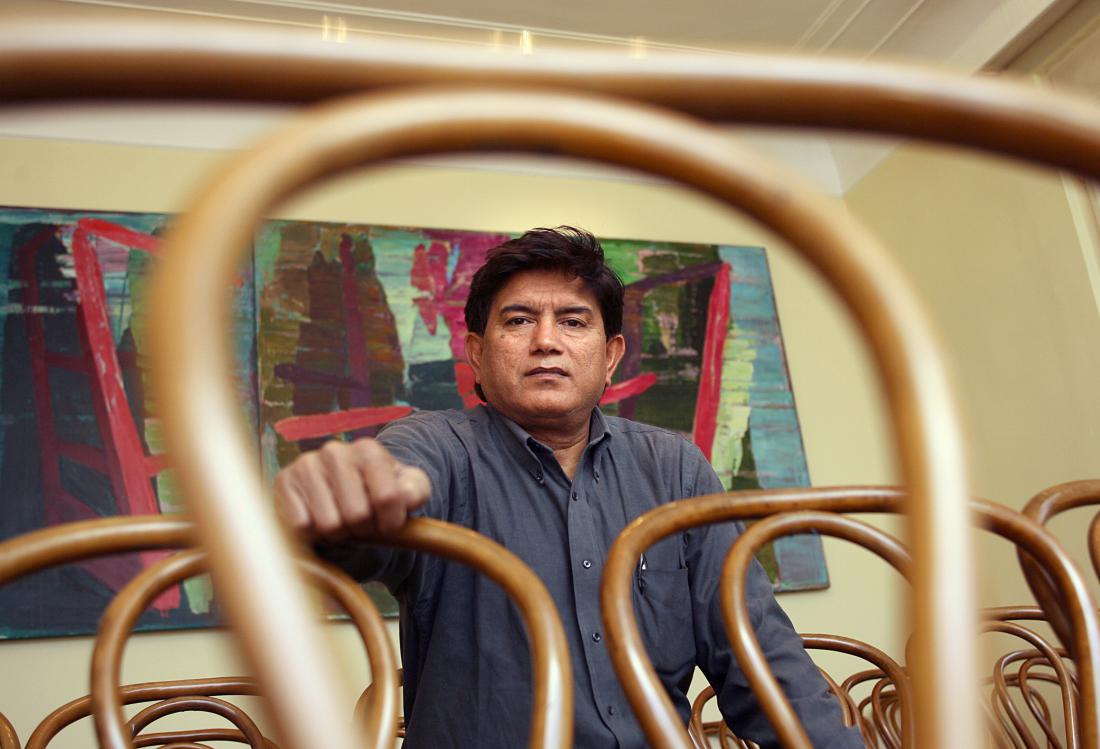
Sedem stvari, ki so povzročile potrese je naslov drugega dela vaših Pretresenih spevov. Kako si je potres razložilo vaše ljudstvo?
V naših verovanjih imamo zelo poetične razlage, zakaj naj bi se zgodili potresi. Po ljudskih verovanjih je to znamenje, da so bogovi jezni. Obstajajo številne razlage, denimo, da so brahmini ubili sveto kravo in s tem povzročili potres. Ali o kralju, ki ga je obiskovala boginja in ga, medtem ko sta igrala šah, poučevala, kako naj vodi kraljestvo. Ko je ugotovila, da se je kralj zaljubil vanjo, je pobegnila, njena jeza pa od tedaj stresa Zemljo. Tretja, denimo, pravi, da so se otroci igrali z iphoni in ipadi in izgubljeni v virtualnih svetovih ubili belo kačo ter jo vrgli v reko Sankosi. Kača je v reki oživela in preklela kraljestvo. V naše razmišljanje je religioznost prirojena. Nepal je bil do 50. let prejšnjega stoletja prava Šangri-La (fiktivna dežela večne sreče, op. a.). Potem so odprli vrata zunanjemu svetu in v državo so prišli turisti in modernizacija. Po zelenih travnikih in riževih poljih so začeli graditi ceste ter ogromne betonske zgradbe in Katmandu spremenili v barakarsko naselje, prenaseljeno, zadimljeno in onesnaženo. Naša dolina je bila zelo plodna; riž je bistven za naše čaščenje in duhovne rituale. Himalajski ekosistem je zelo občutljiv, ljudje pa imajo vse za sveto, zato ogromno dopustijo. Mislim, da je potres nekakšna kulminacija dogajanja od 50. let prejšnjega stoletja, ko so deželo odprli velikim investicijam in naravi ne izkazujejo več nobenega spoštovanja.
V Nepalu je mogoče najti območja, kjer nihče ne uporablja sladkorja, zato nihče nima sladkorne, povišanega krvnega pritiska, nihče ne nosi očal, hrana je biološka, vsak dan hodijo po gorah, živijo zdravo in veliko dlje.
Je Šangri-La, fiktivno deželo večne sreče, in prebivalce, ki živijo več desetletij dlje od povprečne življenjske dobe, kot jih je opisal James Hilton v svojem romanu Izgubljeno obzorje, še mogoče kje najti?
Ko sem se preselil v Nepal, sem našel delo v vasici, ki je bila povsem neokrnjena. To je bil paradiž, ki sem ga iskal. Vaščani so bili preprosti in prijazni, okrog mene pa so se dvigovale mogočne zelene gore. Ko sem opustil delo na univerzi, sem po naključju odšel v Himalajo. Od takrat jo obiščem vsako leto in pišem o njenih lepotah. Tamkajšnji prebivalci se iz dneva v dan borijo za preživetje, a so srečni. Razveselijo se vsakogar in delijo, kar imajo. So kulturno in duhovno bogati ter živijo v skladu z naravo. V Nepalu je mogoče najti območja, kjer nihče ne uporablja sladkorja, zato nihče nima sladkorne, povišanega krvnega pritiska, nihče ne nosi očal, njihova hrana je biološka, vsak dan hodijo po gorah, živijo zdravo in veliko dlje. Čeprav je Nepal majhna država, je podnebno zelo različna. Je dežela ekstremov, imamo najvišje gore, najmlajšo republiko in tam se je rodil eden najbolj veličastnih ljudi na svetu, Buda. Vendar bi politiki deželo radi spremenili v Zahod in še v Himalaji gradijo ceste. Le zakaj bi moral biti Nepal kot Zahod?
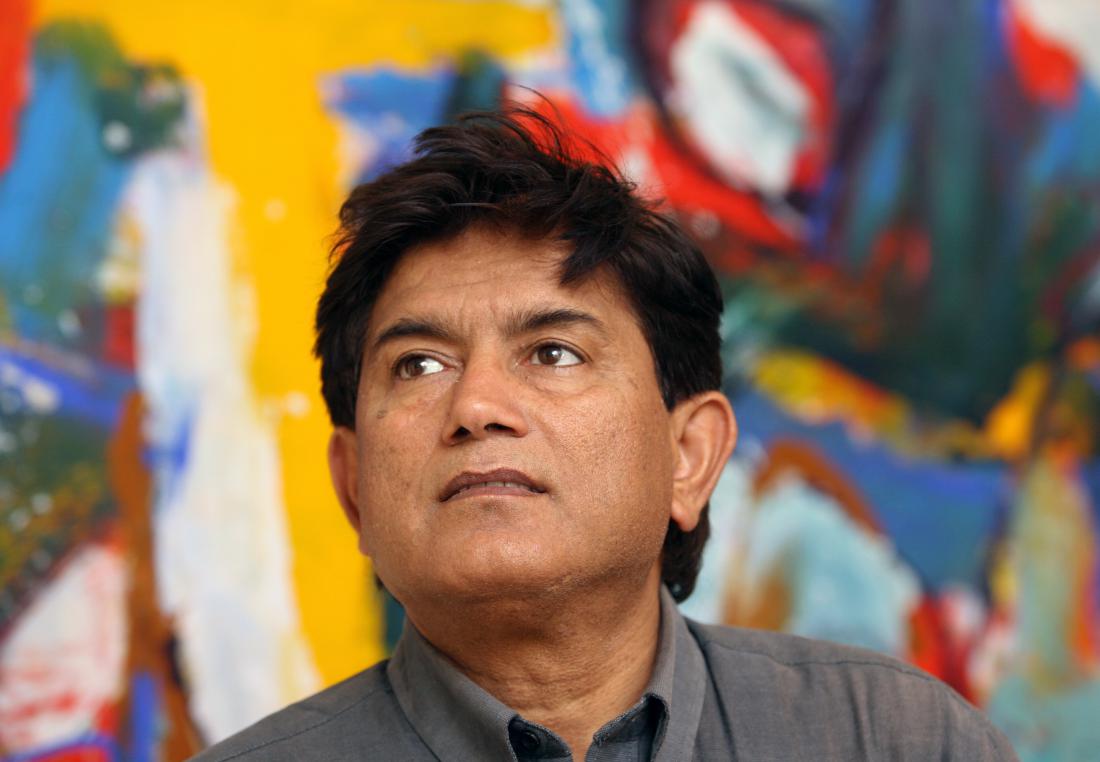
Včasih vas označijo za himalajskega, drugič za nepalskega, tretjič indijskega pesnika. Kaj je pravilno?
Sem vse to. Rojen sem v Indiji, živim v Nepalu, največ pa pišem o Himalaji. Pišem v nepalščini, ki je izjemno lep in poetičen jezik. Ko opevam najvišje gore na svetu, sem srečen. Slavljenje narave je moje zaupanje. Pisati o Himalaji imam za sveto dolžnost. V Himalaji sem našel svoj element, gore so iz mene naredile pesnika. Vendar sem bil pesnik, še preden sem se tega zares zavedal. Na univerzi sem sicer želel postati igralec in igral v Shakespearjevih, Brechtovih, Albeejevih in drugih igrah. Potem sem spoznal Davida Raya, ameriškega pesnika, ki je prišel k nam kot gostujoči profesor. Seznanil me je z ameriško poezijo, denimo Whitmanovo in Ginsbergovo. Povabil me je k sodelovanju pri reviji New Letters, uredil nekaj mojih del ter jih objavil. Ko sem v Nepalu odkril neokrnjeno vasico, kjer sem pri 24 letih napisal svojo prvo pesniško zbirko, se je vse prepletlo. Gorsko divjino čutim kot dušo boga in to je postalo temelj mojemu delu.
Poezija je v Nepalu zelo pomembna. Pesniki pripadamo svetu in smo čaščeni, a se moramo preživeti sami. Pridobiti si moramo bralce in osvojiti srca ljudi. Kot pravi naš mistični pesnik Kabir: Če želiš biti pesnik, zažgi svojo hišo in pridi z mano. Storil sem ravno to, podal sem se na polja življenja in od takrat potujem.
Pravite, da ste bili pesnik, ko se tega še niste zavedali. Kako?
Rodil sem se v zelo religiozni družini. Moj oče je postal goreč sledilec golih sadujev, ki so kadili hašiš in mučili svoja telesa. Med počitnicami sem hodil z njim, v njihovih ašramih sem pomagal pri gospodinjskih opravilih ter se na pamet učil manter in svetih spisov, umetnosti pisanja, recitiranja in čaščenja. Ob nekem prazniku, ko so obdarovali guruja, mu je oče ponudil mene v dar. Želel je, da bi postal njegov učenec. Saduji so me ogledovali, kadili in kašljali, potem pa je guru rekel: Pameten otrok je, pošljite ga v šolo. Če tega ne bi rekel, ne vem, kje bi bil danes ali kakšen bi bil. Ta guru je povsem spremenil moje življenje, saj mi je oče potem omogočil najboljšo mogočo izobrazbo. Bil sem bister in oster in že pri 22 predaval na univerzi v Indiji.
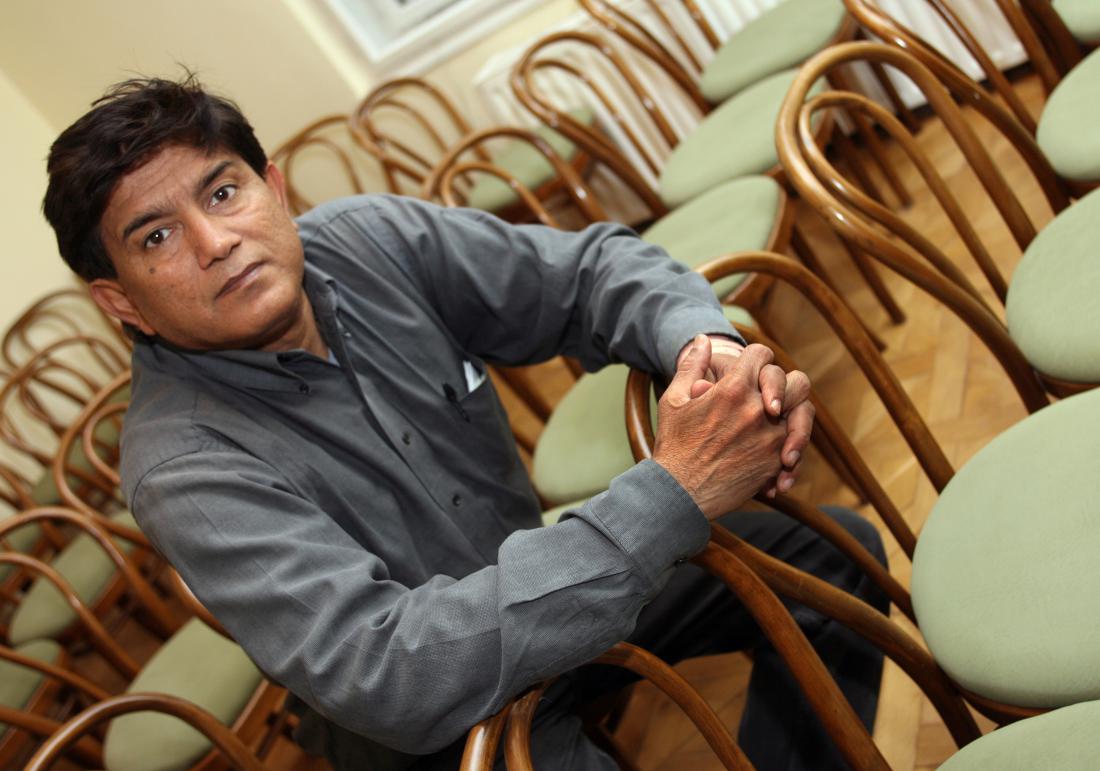
Menda ste bili tudi že pri devetih letih proglašeni za šamana.
To je druga zgodba. Otroštvo sem večinoma preživljal pri dedku in babici po mamini strani. Moj dedek je častil Gorakhnatha, hindujskega jogija in svetnika. Na teh religioznih festivalih vedno veliko bobnajo, ljudje pa postanejo obsedeni, začnejo se tresti in bičati. Ob enem takem prazniku sem se tudi jaz začel tresti, se zvijati po tleh in bičati. Naslednji dan so me vsi imeli za šamana. Moj dedek se je pred menoj priklonil in vaščani so me klicali »babaji«. Zastavljali so mi najrazličnejša vprašanja in jaz sem jim odgovarjal. Vendar sem obiskoval angleško šolo in sčasoma mi je začelo postajati nelagodno. Bal sem se, da me bodo vrstniki imeli za zmešanega. Z učenjem znanosti in logike sem to stran v sebi zatrl. Ko sem začel pisati poezijo, pa je v meni oživela. Ko zdaj pišem ali berem poezijo, se vsakič povežem z nevidnim svetom in ponovno postanem šaman.
Ko je bila moja mama, ki je živela v Pandžabu, še živa, nisem nikoli potoval. Do njene smrti leta 2002 nisem nikdar zapustil Indije ali Nepala. Zanjo me je vedno skrbelo. Po njeni smrti sem se odločil, da se ne bom ničesar več bal, in od takrat nenehno potujem. Še moji otroci se čudijo, da nisem nikoli utrujen.
Kako je poezija sprejeta v Nepalu in kakšen je tamkajšnji položaj pesnikov?
Poezija je v Nepalu zelo pomembna. V Aziji pišejo visoko literaturo. Vsako pleme, vsaka skupnost ima svojo poezijo. Pesniki so v Nepalu odigrali ključno vlogo tudi pri spreminjanju političnega sistema. Eden prvih takih pesnikov je bil Gopal Prasad Rimal, ki je povzročil revolucijo v 50. letih prejšnjega stoletja, ko še ni bilo dovoljeno tiskati knjig ali se javno družiti, deklice pa niso smele obiskovati šol. Je prvi mogočni moderni pesnik, ki so mu sledili številni. Njegove pesmi znajo ljudje še danes na pamet. Pesniki so postali osrednji pri spreminjanju moderne politike, vendar tam za pisanje poezije ne prejemamo štipendij. Pesniki pripadamo svetu in smo čaščeni, a se moramo preživeti sami. Pridobiti si moramo bralce in osvojiti srca ljudi. Kot pravi naš mistični pesnik Kabir: Če želiš biti pesnik, zažgi svojo hišo in pridi z mano. Storil sem ravno to, podal sem se na polja življenja in od takrat potujem.
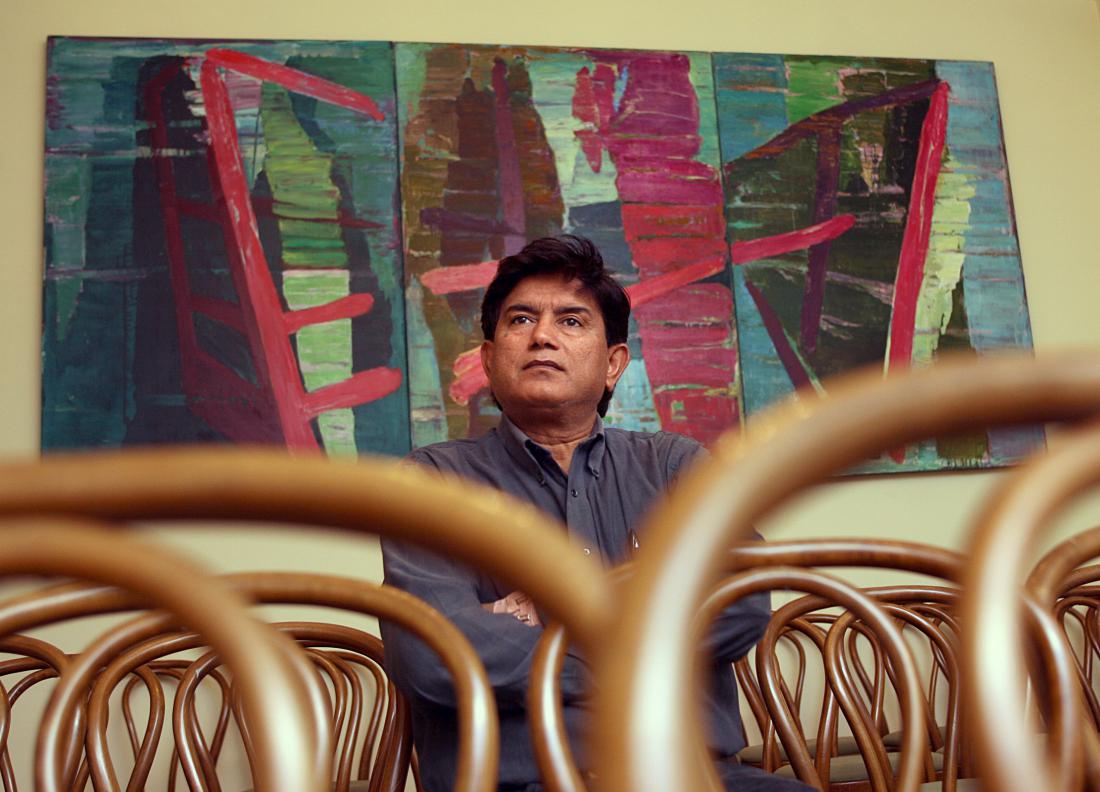
Zakaj toliko potujete?
Ko je bila moja mama, ki je živela v Pandžabu, še živa, nisem nikoli potoval. Do njene smrti leta 2002 nisem nikdar zapustil Indije ali Nepala. Zanjo me je vedno skrbelo. Po njeni smrti sem se odločil, da se ne bom ničesar več bal, in od takrat nenehno potujem. Še moji otroci se čudijo, da nisem nikoli utrujen. Kot pravi moja pesem Družinsko božanstvo v Pretresenih spevih: »In zdaj boš, kamor koli greš, / zmagoval / in vladal srcem / ljudi, ki jih srečuješ / na svojih potovanjih okoli sveta.« To je blagoslov, ki ga je dobil Gorakhnath od boga, mislim, da imam del tega blagoslova svojega učitelja tudi jaz. Tako sem ukrojen. Gradim mostove z ljudmi z drugih celin in razširjam srčne dišave Himalajcev po vsem svetu. Ram Dass Sharma
I saw gods lying on the ground like homeless people
"Poetry has returned my world and life into balance and has given me strength for the future," said Yuyutsu Sharma, a respected reputation among our conversations. He visited Ljubljana on the occasion of the publication of a Slovene translation of his poetry collection, entitled The Shattered Songs: Songs from the Earthquake Nepal. They were created after the devastating earthquake in Nepal in 2015, which left thousands dead, and more than a million people were left without a roof over the head in the middle of the harsh Himalayan climate. Lake Fewa and Horse (2008) are also translated into Slovene from its ten poetic collections. The world-renowned Himalayan poet and journalist who was born in northern India, now living in Kathmandu, is also a great traveler. His poetry, which he claims to be dealing with real life and fundamental truths, has been translated into many languages.

During the earthquake you were on a reading tour across North and Central America. What happened when you received news of the earthquake?
My wife was in New York. We heard about the earthquake, and then there was a communication eclipse, and there was no Internet, no telephone or other connections. We were totally out of ourselves. Only after three days we learned that our closest ones are alive. When we returned, we experienced another earthquake. It was catastrophic. Great sanctuaries and five-storey pagodas, which we took for granted, crashed. They were turned into nothing in the beautiful. When I saw the statue of Lord Vishnu and other gods from our shrine lying on the ground as homeless, I was extremely affected. I had a scene to predict the mountains. As if you could see the statue of Jesus Christ from your home church suddenly on the street. Ancient city buildings have turned into ruins. Everything was full of fear from the threat and total confusion.
Until the 1950s Nepal was a real Shangri-La (the fictional land of eternal happiness, op. A.). Then they opened the door to the outside world and tourists and modernization came to the country. In the green meadows and rice fields, they began to build roads and huge concrete buildings and converted to Kathmandu into a barrack settlement, overcrowded, smoky and contaminated.
How did you deal with the traumatic consequences?
The earthquake was a huge shock and I was absorbed by strong emotions. Everywhere there was fear that it would recur. Every time something shaken, we all fled from the neighborhood with a story from the houses. It was horrible and chaotic. Many were freezing. Others collected precious monuments from roads. Politicians treated the victims of the earthquake politically, which is the worst form of compassion. People received support according to which party they belong to. There were billions, but they were distributed to the parties. Food arrived, but it was sold at the market. The confusion became even greater when the Nepalese people of Tarai of Indian origin demanded equal treatment in the new constitution and India closed the borders. This caused the lack of gasoline and everyday household goods. Most of all I was from myself when I saw my gods on the ground. I started writing.

Seven things that caused earthquakes are the title of the second part of your Shaken songs. How was the earthquake explained by your people?
In our beliefs we have very poetic explanations of why earthquakes should occur. According to human beliefs, this is a sign that the gods are angry. There are many explanations, for example, that the brahmins killed a sacred cow and caused an earthquake. Or about the king who was visited by the goddess and taught him how to lead the kingdom while playing chess. When she realized that the king fell in love with her, she escaped, and her anger has since shook the Earth. The third, for example, says that children played with iphones and ipads and lost in virtual worlds killed a white snake and threw it into the Sankosi River. The snake in the river revived and cursed the kingdom. Religion is inherent in our thinking. Until the 1950s Nepal was a real Shangri-La (the fictional land of eternal happiness, op. A.). Then they opened the door to the outside world and tourists and modernization came to the country. In the green meadows and rice fields, they began to build roads and huge concrete buildings and converted to Kathmandu into a barrack settlement, overcrowded, smoky and contaminated. Our valley was very fertile; rice is essential for our worship and spiritual rituals. The Himalayan ecosystem is very sensitive, and people have everything to be holy, so they allow it a lot. I think that the earthquake is a kind of culmination of the events of the 1950s, when the land was opened to great investments and no longer show any respect to nature. rice is essential for our worship and spiritual rituals. The Himalayan ecosystem is very sensitive, and people have everything to be holy, so they allow it a lot. I think that the earthquake is a kind of culmination of the events of the 1950s, when the land was opened to great investments and no longer show any respect to nature. rice is essential for our worship and spiritual rituals. The Himalayan ecosystem is very sensitive, and people have everything to be holy, so they allow it a lot. I think that the earthquake is a kind of culmination of the events of the 1950s, when the land was opened to great investments and no longer show any respect to nature.
In Nepal, it is possible to find areas where no one uses sugar, so no one has diabetes, high blood pressure, no one wears glasses, food is biological, they walk on the mountain every day, live healthy and much longer.
Is Shangri-La, the fictional land of eternal happiness, and the inhabitants who live decades more than the average lifespan described by James Hilton in his Lost Lost Horizon, maybe elsewhere find?
When I moved to Nepal, I found work in a village that was completely untouched. It was the paradise I was looking for. The villagers were simple and friendly, and the mighty green mountains rallied around me. When I left work at the university, I accidentally went to the Himalayas. Since then, I visit her every year and I write about her beauty. The local population is struggling for survival every day, but they are happy. They cheer everyone up and share what they have. They are culturally and spiritually rich and live in harmony with nature. In Nepal, it is possible to find areas where no one uses sugar, so no one has diabetes, high blood pressure, no one wears glasses, their food is biological, they walk on the mountain every day, live healthy and much longer. Although Nepal is a small country, climate is very different. It is the land of extremes, we have the highest mountains, the youngest republic, and there was born one of the most magnificent people in the world, the Buddha. But the politicians would like to change the country to the West and build roads in the Himalayas. Why should Nepal be the West?

Sometimes they call you Himalayan, secondly for the Nepalese, the third Indian poet. What is correct?
I'm all this. I'm born in India, I live in Nepal, but mostly I write about the Himalayas. I write in Nepali, which is an extremely beautiful and poetic language. When I sing the highest mountains in the world, I am happy. The celebration of nature is my confidence. I have a sacred duty to write about the Himalayas. In the Himalayas, I found my element, the mountains made me a poet from me. But I was a poet before I really knew it. At the university, I wanted to become a player and played in Shakespeare, Brecht, Albee and other games. Then I met David Ray, an American poet who came to us as a visiting professor. He introduced me to American poetry, such as Whitman and Ginsberg. He invited me to participate in the New Letters magazine, arranged some of my works and published them. When I discovered an unspoilt village in Nepal, where at the age of 24 I wrote my first poetry collection, everything got intertwined. I feel the wild wilderness as the soul of God and this has become the foundation of my work.
Poetry is very important in Nepal. Poets belong to the world and we are honored, but we must survive on our own. We need to get the readers and win the hearts of people. As our mystic poet Kabir says: If you want to be a poet, burn your house and come with me. I did just that, I went to the fields of life and since then I travel.
You say that you were a poet when you were not aware of it yet. How?
I was born in a very religious family. My father became an ardent follower of naked Saduys who smoked the hash and tortured their bodies. During the holidays, I walked with him, in their ashrams I helped with household tasks, and learned to master the manners and scriptures, the art of writing, reciting and worship. On a holiday, when they gifted the guru, his father offered me a gift. He wanted to become his student. The Saduji looked at me, smoked and coughed, and then the guru said: A smart child is, send him to school. If I did not say this, I do not know where I would be today or what it would be. This guru has completely changed my life, since my father then enabled me the best possible education. I was bright and sharp and at 22 at the University of India.

You were also supposed to be a shaman at the age of nine.
This is another story. I spent most of my childhood with my grandfather and grandmother on my mother's side. My grandfather worshiped Gorakhnatha, a Hindu yogi and a saint. At these religious festivals, there are always a lot of drums, and people become obsessed, start shaking and screaming. At one such holiday, I also began to shake, to bend on the floor and to scream. The next day, all of us had a shaman. My grandfather bowed before me and the villagers called me "baboons". They asked me a lot of questions and I answered them. But I attended English school and eventually I started to get uncomfortable. I was afraid my peers would have me crazy. With the teachings of science and logic, I put down this side in myself. When I began to write poetry, it brought me to life. Now that I write or read poetry,
When my mom, who lived in Punjab, was still alive, I never traveled. Until her death in 2002, I never left India or Nepal. I was always worried about it. After her death, I decided that I would not be afraid of anything, and since then I have been traveling constantly. Even my children are surprised that I'm never tired.
How is poetry adopted in Nepal and what is the position of the poets there?
Poetry is very important in Nepal. They write high literature in Asia. Each tribe, each community has its own poetry. In Nepal, poets also played a key role in changing the political system. One of the first such poets was Gopal Prasad Rimal, who caused the revolution in the 1950s when it was not allowed to print books or to publicly socialize, and girls could not attend schools. He is the first mighty modern poet, followed by many. His songs are still known to the people today. Poets have become central in changing modern politics, but there are no scholarships for writing poetry. Poets belong to the world and we are honored, but we must survive on our own. We need to get the readers and win the hearts of people. As our mystic poet Kabir says: If you want to be a poet, burn your house and come with me.

Why are you traveling so much?
When my mom, who lived in Punjab, was still alive, I never traveled. Until her death in 2002, I never left India or Nepal. I was always worried about it. After her death, I decided that I would not be afraid of anything, and since then I have been traveling constantly. Even my children are surprised that I'm never tired. As my poem says, the Family Deity in Shattered Speech: "And now you will, wherever you go, win / rule the hearts / people you encounter / on your travels around the world." This is the blessing that Gorakhnath received from God , I think I also have part of this blessing of my teacher. I'm so ruined. I build bridges with people from other continents and spread myths of the Himalayas around the world.
https://onaplus.delo.si/yuyutsu-ram-dass-sharma-bogove-sem-videl-lezati-na-tleh-kot-brezdomce?fbclid=IwAR2G-0DGgOwW5ntFed-yG9rcGgEGOMmuUJ7rbw0fmVuMA6Ntp4IfykzpS9c
https://onaplus.delo.si/yuyutsu-ram-dass-sharma-bogove-sem-videl-lezati-na-tleh-kot-brezdomce?fbclid=IwAR2G-0DGgOwW5ntFed-yG9rcGgEGOMmuUJ7rbw0fmVuMA6Ntp4IfykzpS9c
Sebab mereka bakal benar-benar menghitung taruhan yang bakal dikeluarkan pantas dengan kartu yang mereka pegang.
ReplyDeleteasikqq
dewaqq
sumoqq
interqq
pionpoker
bandar ceme
hobiqq
paito warna
http://199.30.55.59/dewaqq78/
data hk 2019